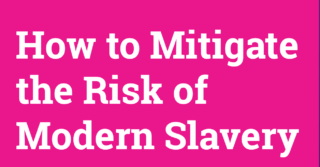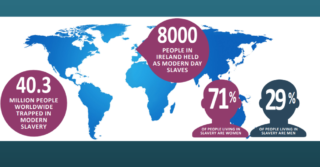Symposium on Non-Financial Reporting: Implications for Business and Human Rights in Ireland
Our Senior CSR Adviser Darina Eades attended the Irish Centre for Human Rights Symposium on Non-Financial Reporting: Implications for Business and Human Rights in Ireland, on April 2 in NUI Galway. Her key insights follow.
 “Any business serious about conducting human rights due diligence is doing so to prevent harm and to unearth any malpractices taking place”.
“Any business serious about conducting human rights due diligence is doing so to prevent harm and to unearth any malpractices taking place”.
It is widely recognised that it is challenging for business to limit all possibilities of human rights infringements in company operations and their supply chains (e.g. with sub-contractors, suppliers and subsidiaries). Even the highest scoring companies in the Corporate Human Rights Benchmark find it difficult.
At the NUIG Symposium on April 2, Professor Karin Buhmann of Copenhagen Business School, emphasised the need for risk-based due diligence, to ensure human rights are upheld and respected as part of the company’s risk management processes.
At a minimum, good due diligence is about preventing harm, seeking remedy for any harm that does happen and ensuring excellence in health & safety. Professor Buhmann talked about the need to factor in human rights into the company’s stakeholder engagement processes, to ensure the company is getting to the people who need to be consulted.
While the 2017 Non-Financial Reporting legislation in Ireland[1] now asks large companies to disclose their human rights impacts, the purpose of the legislation is to drive good business conduct; to support business to choose “to do the right thing, as human lives are at the centre of this”.
As articulated by Professor Buhmann, how can a business truly provide access to remedy “when limbs are lost and when childhoods are lost; and when lives are lost to slavery and death, there is no remedy”.
Any business serious about conducting human rights due diligence is doing so to prevent harm and to unearth any malpractices that are taking place.
Professor Anita Ramasastry of the University of Washington and the UN Working Group on Business & Human Rights echoed the need for risk identification, prevention, mitigation and access to remedy.
She says that while the ‘Social’ element of ESG (Environmental, Social & Governance) loosely covers what happens in the workplace, and is connected to the impact on communities (particularly regarding land use and land acquisition) separate focus and attention must be given to the topic of human rights in and of itself. Conducting human rights due diligence has become mandatory for large companies in France[2], most likely will soon be enacted in Switzerland and is currently being discussed between government and civil society in the UK.
For Professor Ramasastry, non-financial reporting requirements are a very good development because now “more companies will engage with the topic. Many companies are finding it difficult to report because they’re not actually doing anything! They aren’t conducting due diligence and they don’t have the processes in place”.
Mairead Keigher, Reporting Program Manager with Shift and an expert in the UN Guiding Principles Reporting Framework agreed that good human rights disclosure – when aligned with the expectations of the UN Guiding Principles on Business and Human Rights (the ‘UNGPs’) can act as a catalyst for improvement performance. “Conducting due diligence is about identifying the most salient human rights risks[3], developing a policy to respect human rights, embedding that commitment across the company, taking the actions necessary to mitigate the salient risks, tracking activities and disclosing what the company is doing to provide remedy to those impacted”. Human Rights Disclosure, says Mairead, should pivot around the salient human rights of the company, and reflect the implementation of the human rights due diligence process.
Very few companies report their governance on human rights, how senior management are engaging in the issue and the difference various actions taken have made. Mairead says “many companies are struggling with the volume of disclosure requirements and usually the burden falls to one or two people in the organisation”. For that reason she exhorts companies to write their human rights disclosure once, write it well (in line with the expectations of the UNGPs, by using the UN Guiding Principles Reporting Framework) and use the (updated) content for each reporting initiative or requirement.
Shift is a member of the Alliance for Corporate Transparency[4], working on a three year project to review and analyse the non-financial reports of 1000 companies across the EU. The focus of the 2018 pilot (105 companies) was on Energy & Resource Extraction, ICT & Healthcare companies. While 90% of the companies reviewed express a commitment in their report to respect human rights, only 36% describe how they are conducting due diligence and only 10% disclose their management of the issues. Disclosure of the actions taken following audits conducted is particularly low at 16%, and only 8% of companies discuss the limitations of the audits conducted.
Conducting human rights due diligence is about identifying risks to people, not risks to the business. Companies need to focus on the human rights risks inherent within their business model, in both their own operations as well as their value chain.
Women, and migrant workers, are particularly vulnerable (as evidenced by last Sunday’s article on the harrowing abuse faced by Moroccan women in the strawberry industry in southern Spain, who help to cultivate and harvest 400,000 tonnes of strawberries for export to supermarkets all across Europe).
Siobhan Curran, Policy & Advocacy Advisor with Trócaire, talked about their recent publication Making a Killing, and the need for reporting on human rights to be a mechanism to ensure corporate accountability. Since 2015, she says that more than 1400 people globally have been attacked, harassed and criminalised for defending human rights, communities and environmental rights relating to business. In 2018 alone, 321 Human Rights Defenders were murdered. Siobhan cited examples of families being forced out of their homes and off their land by companies only concerned with gaining access to the land. To compound the issues, Human Rights Defenders are often labelled as terrorists. Trócaire is clear on the urgent need for global business to respect human rights in their operations and that Ireland can lead the way in taking action.
How can BITCI Support your business?
As part of Business in the Community Ireland’s services, BITCI members are supported on the topic of human rights through awareness-raising, provision of training on how to conduct human rights due diligence and with the development of policy, governance structures and reporting.
The topic of Human Rights also features in both the Governance and Sustainable Procurement indicators of BITCI’s Business Working Responsibly Mark – Ireland’s standard for CSR & Sustainability, based on ISO 26000 and independently audited by the NSAI.
Upcoming Workshop: Reporting the impact of the business on human rights
We are holding a workshop for members on Reporting the Impact of the Business on Human Rights on May 8, 2019, 10 am – 1 pm, hosted by A&L Goodbody.
This Workshop will feature the work of three BITCI member companies, how they are conducting risk-based human rights due diligence and reporting the results of their research, investigations and supplier engagement. Contact events@bitc.ie for more information.
To find out more about how we can support your company to conduct risk-based human rights due diligence, please contact Darina Eades, Senior Adviser on Corporate Responsibility at deades@bitc.ie
Notes
[1] The Non-Financial Reporting Legislation in Ireland is applicable to public-interest entities (PLCs, banks and insurance companies etc) with more than 500 employees (and total assets exceeding €20 million or a turnover of €40 million). From 2018, these organisations must disclose in their management report, information on their policies, risks and outcomes relating to Environmental Matters; Social & Employee Aspects; Respect for Human Rights; Anti-Corruption & Bribery; and Diversity in the Board of Directors. For more information, see: https://dbei.gov.ie/en/Legislation/Legislation-Files/SI-No-360-of-2017.pdf
[2] Large companies falling within the scope of the French Due Diligence Law are expected to develop, implement, and publish their due diligence plans to identify risks and prevent infringements on human rights, fundamental freedoms, health and safety, and the environment
[3] Those human rights at risk of the most severe negative impact. For more information, see https://www.ungpreporting.org/resources/salient-human-rights-issues/
[4] The Alliance for Corporate Transparency has analysed how European companies disclose information necessary for understanding their impact on society and the environment, as required by the EU Non-financial Reporting Directive. See https://www.allianceforcorporatetransparency.org/news/companies-failing.html






